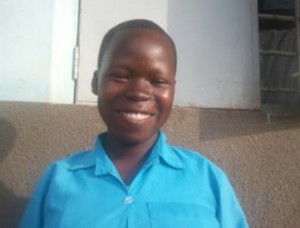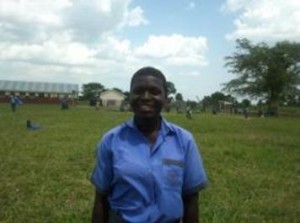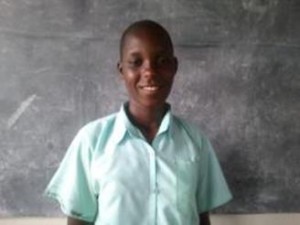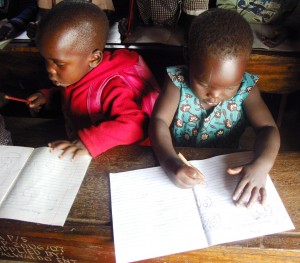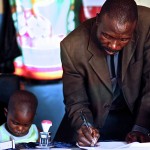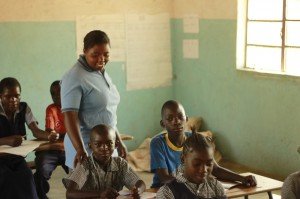Meet Susan Piloya #GirlsEducation
February 5, 2015We would like to introduce you to Susan Piloya, a 14 year old student in Class P6 at Koch Goma Primary School – one of the highest population schools in the region, with over 1,000 pupils.
Water, sanitation and hygiene (WASH) is recognised as a crucial component affecting the quality of girls’ education in developing countries. Without access to facilities including hygienic latrines and changing rooms, girls are at serious risk of illness, school dropout and sexual abuse. This often puts them at a significant disadvantage to their male counterparts, hindering boys’ and girls’ equitable access to education.
If girls are to be encouraged to stay in school they need clean, private facilities in which to feel safe and secure. Too often in countries like Uganda there is either a complete lack of such facilities in schools, or girls are forced to use changing rooms and washrooms which are dirty or have no doors, leaving them exposed and potentially unsafe. Thanks to large programmes in the mid-90s like UNICEF’s Water, Education and Sanitation programme, which ran from 1995 – 2000, there has been an increase in the prevalence of such facilities for girls, but there is still a long way to go.
Girls’ access to changing rooms and washrooms is of particular importance during menstruation; it is all-too-common for girls to feel they have to skip school in order to manage their periods. Without clean and private changing rooms and washrooms they have nowhere to change dirty pads and manage their personal hygiene. Providing girls’ changing rooms and washrooms enables them to manage their menstruation with dignity, encouraging them to stay in school throughout their periods, and ultimately to stay in school full stop.
After attending one of our workshops for girls, Susan told us:
“Before the girls’ workshop, I would always feel uncomfortable going to the toilet to change my pads. Now I know it is normal and I’m healthy. I learnt how to take care of myself during menstruation and this has allowed me to stay freely in school throughout my period”.
“After the training I have been telling other girls how to avoid early pregnancy. I have been telling them about using condoms or abstaining from sex so that they can continue with their studies uninterrupted by pregnancy.”
Because many pupils lack the opportunity to become more aware of changes in their bodies when they grow up, girls often become the target of bullying and ridicule from boys at school. We have found that, unfortunately, many girls suffer these experiences in silence and are put off going to school as a result.With greater information, we hope to change this outlook for many girls in the region.
Since the start of the project, we have found strong support, both from teachers and from the local community, for girls’ education. This support has been so strong that the school community itself came up with the idea of forming after-school clusters. This allows a senior mother figure to mentor and support girls experiencing challenges, and is proving to be an effective way of encouraging girls to stay in school.
We are looking to build on the success of this programme both in northern Uganda and with the community schools we work with in Kalomo District, Zambia. Read more about the programme here.
Set up a monthly donation here.
Posted in News | Leave a commentMeet Esther Lakica #GirlsEducation
February 5, 2015As part of African Revival’s #GirlsEducation month, we are introducing you to some of the amazing girls we are supporting this year in Northern Uganda. Today, we meet Esther Lakica, a 16 year old student in Class P7 at Bwobomanam Primary School.
Bwobomanam primary school is one of the beneficiary schools of our Girls’ Access to Education Project and is also on our Model Schools Programme. We have worked with Bwobomanam for nearly 6 years, and have met some fantastic students there in that time.
When we first met Esther, she was a very shy and timid girl. However, our interaction with Esther over the years has seen her come out of her shell and gain self-confidence and assertiveness. When the African Revival M&E team visited Esther recently, she said:
“The knowledge I gained has helped me to avoid peer influence, I can say no to bad suggestions from friends. The pads have helped me a lot because when I have my periods, I now have something to use so I can stay in school.”
“I had a friend who would lure me to go to the disco, with the knowledge from the workshop I am now more confident to say no. I have applied the same knowledge to advances from boys. All of us can choose whether to make the right or wrong decisions.”
“I had a friend liked sleeping around as a solution to her problems. Also her mother wanted her to get married to help solve their financial issues and she was very stressed and frustrated. I advised her to speak with the senior woman teacher.”
Sadly, there are many girls like Esther’s friends in rural schools in the region who have never had the opportunity to be mentored, or acquire information that is vital in helping them make informed decisions. With your help, we can reach more girls and ensure that they are able to get the best education possible.
Posted in News | Leave a commentMeet Vicky Adong #GirlsEducation
February 5, 2015As part of our #GirlsEducation month, we’re going to introduce you to some of the girls we work with in Northern Uganda. Today, we meet Vicky Adong, a 15 year old student in Class P7 at Koch Lila School.
When Vicky stood up to share her experience with the girls in one of our sensitization workshops, she said:
“The knowledge I gained back when African Revival came to our school has helped, I have avoided bad friends and abstained from early sex. The pads I received have really helped, the money I would have used to buy pads I now use to buy scholastic materials.”
“I mentored my friend who was in a bad group that went to discos and stopped going to school. I told her to leave that group and come back to school because it is her future that she is playing with. A friend of mine missed the training, I took it upon myself to educate her on hygiene, menstruation and the risks of early sex and pregnancy. We are now completing together as she has listened.”
When African Revival staff contacted the school again recently to see how Vicky was getting on, we were told that she had joined a local secondary school – something she was able to do having been supported by our Girls’ Access to Education Project. It is our hope that many more girls will be able to benefit from this project and go on to achieve great things from their education.
Posted in News | Leave a comment#GirlsEducation Update
February 5, 2015Girls’ Access to Education
This month at African Revival, we are focusing on #GirlsEducation because we believe that every girl has the right to a quality education.
Over the last 2 years, we have implemented a Girls’ Access to Education Project in 10 schools across Northern Uganda. It involved construction of girls’ changing and wash rooms, sensitization workshops for girls and boys (from upper primary) and the provision of sanitary pads. There were also workshops which addressed social issues incarnate in Ugandan culture which affect the education of girls, notably early marriage and pregnancy, issues surrounding menstruation, lack of parental support, and the preferential treatment often given to boys over girls in education. All these are ingredients to school drop-outs and low completion rates for girls at school.
Mary Adyero, the District GEM chairperson, recently had this to say about the project after attending one of African Revival’s workshops in Koch Goma primary school; “the training shall help the girls of Koch Goma, I will also use my position to ensure that all the girls in the district benefit from this workshop”.
Together, we can make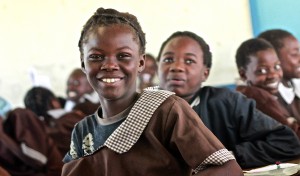 a significant impact on #GirlsEducation and ensure that as many girls as possible in Uganda and Zambia are getting the education they deserve – because when you educate a girl, you educate a family, and a whole nation.
a significant impact on #GirlsEducation and ensure that as many girls as possible in Uganda and Zambia are getting the education they deserve – because when you educate a girl, you educate a family, and a whole nation.
Posted in News | Leave a comment
Great news – Bestseller Fund to fund 3 year project in Amuru
January 19, 2015 Last week we signed a partner agreement with the Bestseller Fund, based in Copenhagen, to run a Schools Demonstration Garden Project in 15 schools in Amuru District. The 3 year funding is given after Bestseller Project Manager Mette Müller Kristensen visited our Gulu office in July and saw our project in action in Nwoya district. We’re very excited to work with Bestseller Fund team Mette, Kristian, Martin and Stine on a project model we’re very proud of at African Revival.
Last week we signed a partner agreement with the Bestseller Fund, based in Copenhagen, to run a Schools Demonstration Garden Project in 15 schools in Amuru District. The 3 year funding is given after Bestseller Project Manager Mette Müller Kristensen visited our Gulu office in July and saw our project in action in Nwoya district. We’re very excited to work with Bestseller Fund team Mette, Kristian, Martin and Stine on a project model we’re very proud of at African Revival.
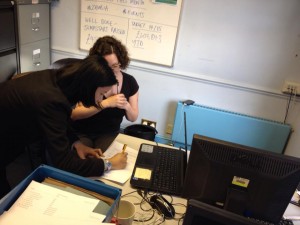 This project ties education and livelihoods together, and is one of African Revival’s core areas of expertise. Our intervention seeks to address two interlinked issues – low quality education at a primary level and food insecurity compounded by poor agricultural productivity. The project creates stronger links between parents and schools leading to increased enrolment, attendance and academic attainment and children are also learning practical agricultural skills. Parents increase agricultural productivity both at the school garden and home gardens, both increasing food security and nutrition. African Revival also links farmers and markets to increase opportunities for income generation – making the project both sustainable and holistic.
This project ties education and livelihoods together, and is one of African Revival’s core areas of expertise. Our intervention seeks to address two interlinked issues – low quality education at a primary level and food insecurity compounded by poor agricultural productivity. The project creates stronger links between parents and schools leading to increased enrolment, attendance and academic attainment and children are also learning practical agricultural skills. Parents increase agricultural productivity both at the school garden and home gardens, both increasing food security and nutrition. African Revival also links farmers and markets to increase opportunities for income generation – making the project both sustainable and holistic.
How does it work?
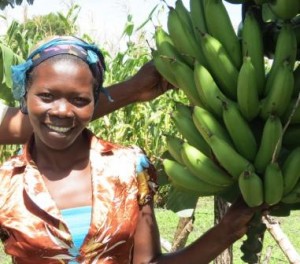 Initially, our field officers would work with the District Education Officer to identify and select schools to implement the project within. Once the schools have been selected, the Head Teacher, the School Management Committee (SMC) and community members would be involved in selecting a site for the garden in the school grounds. Working with these stakeholders the field staff would then choose appropriate crops for each group, followed by preparation of the land and training on cultivation.
Initially, our field officers would work with the District Education Officer to identify and select schools to implement the project within. Once the schools have been selected, the Head Teacher, the School Management Committee (SMC) and community members would be involved in selecting a site for the garden in the school grounds. Working with these stakeholders the field staff would then choose appropriate crops for each group, followed by preparation of the land and training on cultivation.
At all school locations, African Revival works with the community to create farmer groups comprising of 25-30 members who will work with the school on the demonstration garden, attend weekly meetings and receive practical trainings by African Revival field staff. In addition to the above, African Revival also aims to secure gender balance within the farmer groups and working closely with the District Education Officer to select suitable schools for this project.
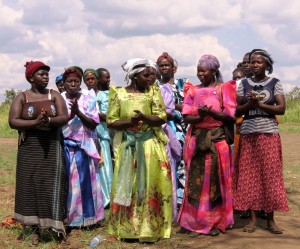 After the first harvest (two per year), the groups will then distribute their profits from the yields – with linkages to local suppliers provided by African Revival. Typically, 30% is given back to the school where the school, the Parent Teacher Association (PTA) and SMC decide how it will be spent. Previously, they have used it to provide school meals, buy scholastic materials, constructing structures like latrines and buying solar panels; another 30% is kept as group development fund and the remaining 40% is shared among group members.
After the first harvest (two per year), the groups will then distribute their profits from the yields – with linkages to local suppliers provided by African Revival. Typically, 30% is given back to the school where the school, the Parent Teacher Association (PTA) and SMC decide how it will be spent. Previously, they have used it to provide school meals, buy scholastic materials, constructing structures like latrines and buying solar panels; another 30% is kept as group development fund and the remaining 40% is shared among group members.
The model uses the primary school as a learning site but the goal is to ensure that the agricultural skills from the school demonstration gardens is also utilised by the farmers at their homesteads. To achieve this, the initial group of up to 30 members in Year 3 will be split into two clusters, who in turn will impart their knowledge within their individual villages. Year 3 has a focus on sustaining the impact by ensuring that individual farmers are now fully utilising the new skills in agriculture.
Posted in News | Leave a commentClassroom block at Mabuyu nears completion
January 5, 2015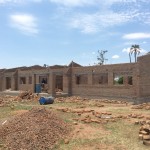 Good quality classrooms are fundamental to the success or failure of a school. Yet right across rural Zambia children are learning under trees or in unsuitable, and often structurally unsafe classrooms.
Good quality classrooms are fundamental to the success or failure of a school. Yet right across rural Zambia children are learning under trees or in unsuitable, and often structurally unsafe classrooms.
Thanks to generous donations, we are nearing the completion of block of three classrooms at Mabuyu School.
The Head Teacher is pleased with the difference the classroom will make, both on the quality of teaching and exam pass rates. He said of the classroom “When the classroom is built the children will be able to sit their exams here. Now, they must walk to the nearest exam centre, which we know impacts on their grades.”
A shortage of classrooms means large class sizes, different year groups being taught at the same time and children unable to study after Grade 7. This leaves children unable to progress to secondary school. With your support, we are working with schools to address these barriers which prevent equal access to quality education, to allow every child to fulfill their potential.
Posted in News | Leave a commentTeacher Training in Zambia – We meet Sajida
January 5, 2015In Zambia we work in the Kalomo District of the Southern Province, where we have developed a strong and dynamic relationship with the Kalomo District Education Board and over 25 schools. We are now the only organisation supporting the Kalomo District Education Board to strengthen the quality of primary education in the region, since a number of large international NGOs have ended programmes. Despite the reduction in NGO support Kalomo remains one of the most impoverished in the Southern Province with some of the lowest examination results in the country according to Government statistics. In 2011 the district was placed ranked last in the National examination league, and literacy rates stand at around 30%.
With the District Education Board we identified lack of trained teachers as a main contributing factor to this poor performance. Many community teachers are working without training, and often without pay. To address this problem, for the last year we have been working with Charles Lwenga Teaching College to support 20 community school teachers from Kalomo to study towards a Diploma in Education. Learning out of term time over the course of three years, these teachers will eventually become government-accredited teachers, and much better equipped to teach the curriculum. By investing in teacher training we aim to boost quality standards and improve educational outcomes for children in the district.
Sajida is one of the twenty young teachers enrolled on the teacher training programme.
It’s very quiet in Sajida’s classroom when we visit as the children take their end of term Maths test. Sajida says of her training, “I’m enjoying. What we’ve learnt is how to manage a class. To understand the behaviour of the children. I have to understand the behaviours of each different child. And it helps me see that, this one learns this way, she can understand.”
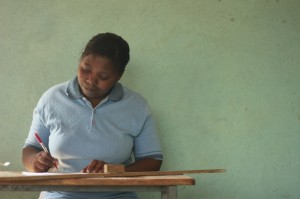 “My ambition for the future is to go up a grade, getting more knowledge of education and becoming a better teacher.”
“My ambition for the future is to go up a grade, getting more knowledge of education and becoming a better teacher.”
With your help, teachers like Sajida are receiving the training they need to provide the quality education that will give children a brighter future.
Set up a monthly donation here.
Posted in News | Leave a commentThank you – you did it!
January 5, 2015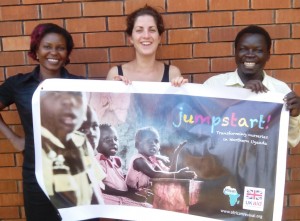 It was a fantastic team effort, and we did it – we smashed through our target for jumpstart! The total is in and we’re delighted that after being doubled by the UK government the appeal raised a fantastic £457,701.
It was a fantastic team effort, and we did it – we smashed through our target for jumpstart! The total is in and we’re delighted that after being doubled by the UK government the appeal raised a fantastic £457,701.
From our flagship fundraising ball, to individual donations, sponsored events and cash collections it all adds up to a huge achievement.
The Uganda team (including Scovia, Alex and Richard pictured) have been hard at work preparing for the programme launch in February. Recruitment has started for the two Education Programme Officers who will work with the ten nurseries over the three year period to offer ongoing teacher training and support.
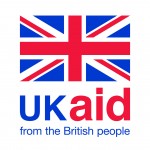 We will also be building playgrounds at each nursery, providing teaching and learning resources and engaging parents in their children’s learning.
We will also be building playgrounds at each nursery, providing teaching and learning resources and engaging parents in their children’s learning.
All this has only been made possible with your fantastic support – thank you so much
Posted in News | Leave a commentHappy New Year from our CEO
January 5, 2015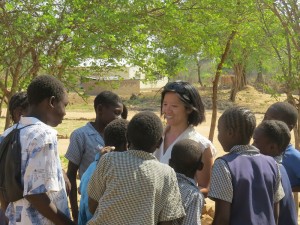 I hope you celebrated the start of 2015 in good spirits with family and friends. Now that we’re a few days into the New Year, I’d like us to look ahead and think about what this year may bring. But first, I would like to take a quick look back.
I hope you celebrated the start of 2015 in good spirits with family and friends. Now that we’re a few days into the New Year, I’d like us to look ahead and think about what this year may bring. But first, I would like to take a quick look back.
2014 was quite a year for all of us at African Revival. We’ve been through many changes and developments, but we’ve managed to sail through it all and still achieve what we had set out to do in 2014.
It’s been only 5 weeks since you helped us meet the fundraising target of our match funding appeal jumpstart! supported by the UK government for the introduction of a 3-year nursery programme in 10 children’s centres in northern Uganda. We are excited to announce that, thanks to your contribution and support, the preparation for this programme is well underway and jumpstart! will officially start when schools reopen in the first week of February.
Other 2015 programmes include our school demonstration garden project in 4 districts in northern Uganda, as well as our teaching training programme and teacher salary support programme in Zambia, our ongoing school infrastructure projects and provision other learning materials and teaching resources.
I would like to take this opportunity to thank our teams in London, Gulu and Kalomo for their dedication and hard work over the past year as well as our growing number of supporters – both donors and volunteers – on whose contributions African Revival relies on for its ability to reach out to even more children and help them fulfil their potential.
I look forward to another busy and productive year, and wish you all the best for the year ahead.
With very best wishes,
Colleen Yuen
Chief Executive Officer
We hear from Walter at Lutuk Primary School
December 15, 2014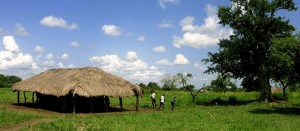 Walter founded Lutuk Primary School when he was just 19, in 2009. Before the school was built, when community members returned from the IDP (Internally Displaced People) camps inhabited during the war, children faced a long walk to the nearest government school. The community worked together to construct the original buildings and since then, African Revival has worked with the community to build a 3 x 1 classroom.
Walter founded Lutuk Primary School when he was just 19, in 2009. Before the school was built, when community members returned from the IDP (Internally Displaced People) camps inhabited during the war, children faced a long walk to the nearest government school. The community worked together to construct the original buildings and since then, African Revival has worked with the community to build a 3 x 1 classroom.
The other challenge faced by Lutuk was the lack of training for teachers. Now 3 teachers at the school, including the Head Walter, are receiving training at a nearby teaching college, supported by African Revival.
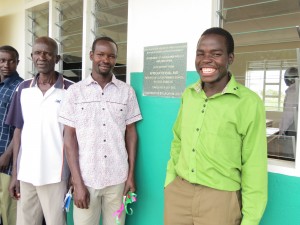 Under Walter’s leadership, the school is flourishing. In 2009 the school started with 64 pupils and now has 267 pupils. In the last round of Primary Leaver’s Examinations, which are sat in the final year of primary school, one of the female students at Lutuk had the 5th highest exam score in the distict.
Under Walter’s leadership, the school is flourishing. In 2009 the school started with 64 pupils and now has 267 pupils. In the last round of Primary Leaver’s Examinations, which are sat in the final year of primary school, one of the female students at Lutuk had the 5th highest exam score in the distict.
Walter hopes that in the future the government will begin to fund Lutuk and send government trained and salaried teachers, now that the school facilities have greatly improved. Lutuk is a great example of the inspiring work of the communities and individuals African Revival is proud to work with, and we look forward to continuing to work with the school and seeing it go from strength to strength.
Posted in News | Leave a comment

